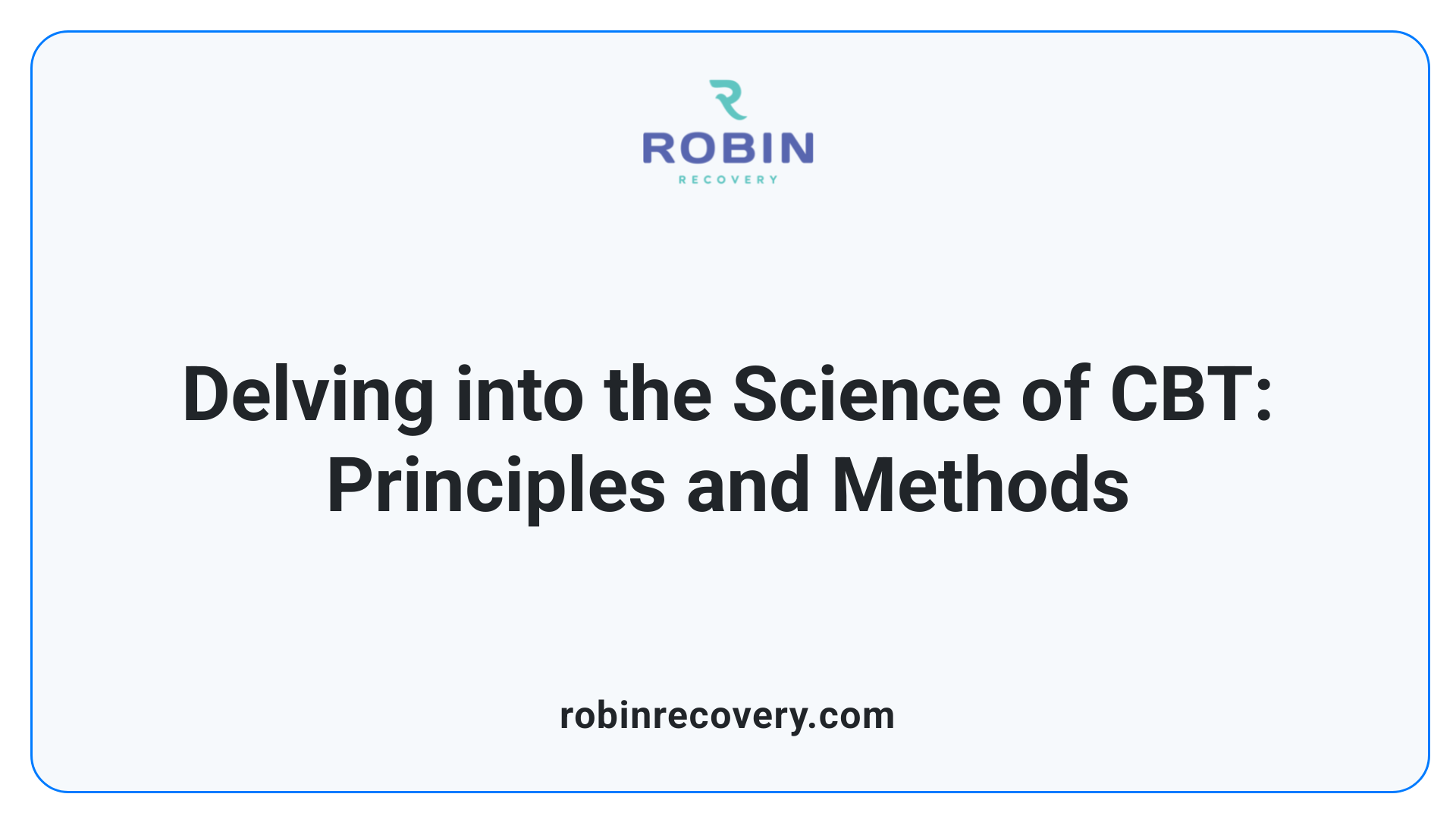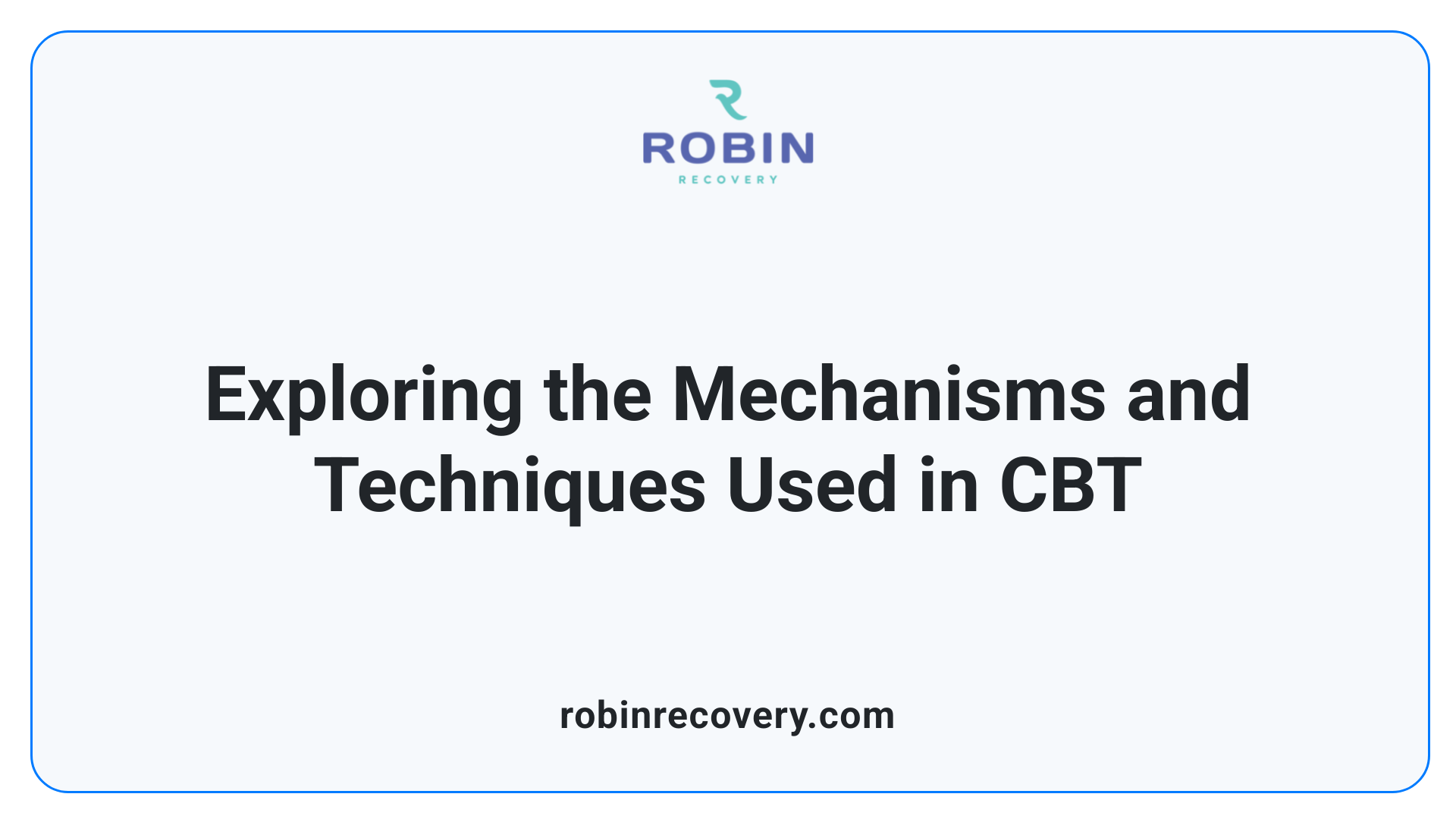The Science Behind CBT and Its Effectiveness in Treating Addiction

Understanding the Basics of CBT
Cognitive Behavioral Therapy (CBT) is a cornerstone in psychological treatment, particularly effective in confronting addiction and its underlying causes. This therapy operates on the notion that our thoughts, emotions, and behaviors are inextricably linked, and altering one component can lead to changes in the others. Widely integrated into many addiction treatment programs, CBT's scientific backing and adaptable methodology make it a vital tool in the fight against substance use disorders. This article explores the principles, methods, scientific support, and effectiveness of CBT in treating addiction.
The Foundation of CBT in Addiction Treatment

What is Cognitive Behavioral Therapy (CBT) and how does it help in treating addiction?
Cognitive Behavioral Therapy (CBT) is an evidence-based psychological treatment designed to address negative thought patterns and behavioral issues. Its application in treating addiction is structured around several core principles, primarily focusing on helping individuals develop coping mechanisms and manage triggers that may lead to substance use.
CBT assists individuals by promoting self-awareness about how thoughts, feelings, and behaviors are interconnected. By identifying harmful beliefs—like the notion that "I need alcohol to relax"—CBT empowers patients to challenge and alter these thoughts, paving the way for healthier coping strategies. This is particularly vital for maintaining abstinence and managing cravings, which are significant challenges in the recovery process.
Furthermore, CBT often incorporates techniques like Motivational Interviewing (MI) to enhance adherence to treatment and boost motivation for change. Studies suggest that when CBT is paired with other therapeutic approaches, including contingency management, the likelihood of successful recovery increases. These integrated methods yield better outcomes, especially in the earlier stages of the treatment journey.
Overview of CBT techniques
CBT employs a variety of intervention techniques including:
- Cognitive Restructuring: Helps individuals identify and challenge negative thoughts related to substance use.
- Skills Training: Focuses on unlearning maladaptive behaviors and developing healthy coping strategies.
- Relapse Prevention: Equips individuals with tools to recognize high-risk situations and manage cravings effectively.
- Mindfulness Practices: Encourages healthy coping mechanisms to deal with stress without reverting to substance use.
Research continuously demonstrates that CBT not only aids in reducing substance use but also leads to significant improvements in mental health, particularly in alleviating symptoms of anxiety and depression often concomitant with addiction issues. Through these comprehensive strategies, CBT serves as a crucial element of a holistic approach to addiction treatment, reinforcing sustainable recovery.
Scientific Principles and Methodologies Behind CBT

What are the scientific principles and methodologies behind CBT for addiction treatment?
Cognitive Behavioral Therapy (CBT) operates on the foundation that substance use disorders arise from irrational or negative thought patterns and maladaptive behaviors. These erroneous beliefs can lead to substance use as a coping mechanism, perpetuating the cycle of addiction.
The primary objective of CBT is to reframe these negative thoughts, allowing individuals to gain a deeper understanding of their triggers. This is achieved through strategies such as:
- Cognitive Restructuring: Identifying and challenging harmful beliefs regarding substance use.
- Skills Training: Providing patients with techniques to manage cravings and cope with triggers effectively.
- Functional Analysis: Understanding the thoughts, feelings, and contexts that lead to substance use.
Additionally, CBT emphasizes self-efficacy, fostering a sense of control over one's actions. This is vital in shifting outcome expectancies related to substance use. As individuals begin to see that they can effectively manage their cravings and avoid relapse, their motivation for change significantly increases.
Research supports the efficacy of CBT, showcasing improvements in addiction outcomes across various substances. This effectiveness is further enhanced when CBT is tailored to accommodate individual experiences and co-occurring mental health issues, thereby addressing the complexities of addiction holistically.
Such personalized care within CBT not only aids in immediate recovery but also equips individuals with lifelong skills to navigate post-treatment challenges, emphasizing the therapy's long-term impact.
Assessing CBT's Efficacy Compared to Other Treatments

How effective is CBT compared to other treatments for addiction?
Cognitive Behavioral Therapy (CBT) is recognized as a highly effective treatment for addiction. It demonstrates comparable effectiveness to other psychological therapies and medications, often even surpassing them in certain contexts. CBT operates with a structured framework aimed at altering unhelpful thought patterns and behaviors. This allows individuals to gain insight into their addiction and manage their responses effectively.
Research shows that CBT may yield longer-lasting benefits compared to medication alone. This is especially pertinent when addressing anxiety-related issues that often co-occur with addiction. Additionally, CBT typically requires a limited number of sessions—ranging from 12 to 20 weeks—making it a time-efficient option.
Success rates and effect sizes
The overall effect size of CBT has been noted to be moderate, with a meta-analytic review indicating an effect size of d = 0.45, suggesting that patients experience significant benefits from this approach. Furthermore, studies have shown that approximately 60% of individuals treated with CBT for substance use maintain their recovery for at least one year, indicating a promising success rate in long-term recovery.
CBT vs. other treatment modalities
While traditional CBT shows effective results, it’s essential to recognize that combining CBT with other evidence-based treatments can enhance outcomes. For example, integrating CBT with Motivational Interviewing (MI) and Contingency Management (CM) often leads to better results than using CBT alone, particularly during the early treatment stages. This integrated approach addresses various psychological, social, and emotional aspects of addiction, thus maximizing the potential for sustained recovery.
The Mechanisms and Techniques of CBT

What are the mechanisms and techniques used in CBT for addressing addiction?
Cognitive Behavioral Therapy (CBT) employs a variety of techniques to address addiction, focusing on altering negative thought patterns and behaviors that contribute to substance use.
Cognitive Restructuring and Skill-Building
One core mechanism of CBT is cognitive restructuring, which helps individuals identify and modify maladaptive beliefs related to substance use. For instance, a person may learn to challenge thoughts like "I need alcohol to relax" by reframing this belief into more positive and realistic thoughts.
Alongside cognitive restructuring, skill-building exercises play a vital role. These exercises aim to develop coping strategies that empower individuals to handle cravings effectively. Techniques include:
- Functional analysis: Identifying triggers and the circumstances leading to substance use.
- Skills training: Learning positive behaviors to replace maladaptive ones.
Relapse Prevention and Contingency Management
CBT also integrates relapse prevention strategies, helping individuals recognize high-risk situations and providing them with alternative coping mechanisms. This approach reinforces the ability to mitigate cravings and manage triggers without resorting to substance use.
Incorporating interventions like Motivational Interviewing and Contingency Management further supports recovery by motivating individuals toward positive change and rewarding adherence to treatment goals. Overall, the structured and evidence-based nature of CBT effectively supports individuals in achieving long-term recovery from addiction.
Research and Evidence Supporting CBT
What evidence supports the use of CBT for addiction recovery?
Numerous studies and clinical trials indicate that Cognitive Behavioral Therapy (CBT) is effective for addiction recovery, supporting its use as part of comprehensive treatment plans.
CBT has shown robust efficacy compared to minimal and usual care conditions, with effect sizes typically in the small-to-moderate range. This indicates clinically meaningful improvements in both substance use and psychosocial outcomes. Moreover, CBT tends to be particularly effective when combined with other evidence-based treatments such as Motivational Interviewing (MI) and Contingency Management (CM).
What are the recovery rates linked to CBT?
Research shows that approximately 60% of individuals treated with CBT can maintain their recovery for at least one year. This statistic underscores the efficacy of the skills learned during therapy, contributing to long-term recovery and relapse prevention.
What does evidence from controlled trials reveal?
Overall, CBT remains one of the most researched psychosocial treatments for substance use disorders. A review of over 53 randomized controlled trials supports its use, showing significant improvements in self-control, decision-making, and emotional regulation among participants. These findings highlight the therapy's potential for equipping individuals with lifelong skills that support sustained recovery.
AspectFindingsSignificanceEffectiveness Moderate effect size (d = 0.45) Indicates meaningful benefits Recovery Maintenance ~60% maintain recovery for at least one year Highlights long-term effectiveness Research Support Over 53 studies demonstrate significant positive outcomes for substance use disorders Reinforces its credibility in treatment
CBT’s Neuropsychological Impact
Impact of CBT on Brain Function
Cognitive Behavioral Therapy (CBT) is not just about changing thoughts and behaviors; it also plays a significant role in brain function. Through targeted interventions, CBT enhances decision-making and impulse control by improving the functioning of the prefrontal cortex—a region critical for managing cravings and regulating emotions. This neurobiological improvement aids individuals in resisting substance use and making healthier choices.
Neuroplasticity and Addiction Treatment
Neuroplasticity is the brain's ability to adapt and reorganize itself in response to experiences. CBT leverages this principle to create new neural pathways that support healthier thought patterns and behaviors. As patients learn and apply the coping strategies taught in therapy, their brains can rewire, leading to lasting change even after treatment concludes. This aspect of CBT ensures that the skills learned can offer long-term benefits in sustaining recovery.
Behavioral Change through Neural Pathways
The relationship between CBT and behavioral change is significant. By addressing cognitive distortions—such as the belief that one needs substances to cope—CBT enables individuals to challenge and replace these harmful thoughts. This process, supported by the development of new neural pathways, helps individuals establish healthier behaviors and cope with triggers effectively, contributing to reduced relapse rates and improved overall mental health.
Practical Applications and Flexibility of CBT
Use of CBT in Different Settings
Cognitive Behavioral Therapy (CBT) has become a cornerstone in addiction treatment, utilized in various environments, including outpatient clinics, inpatient facilities, and even community centers. Its versatility allows for integration into comprehensive recovery plans, often combined with pharmacotherapy such as methadone maintenance therapy for optimal results.
Flexibility and Digital Delivery Formats
One of the significant advantages of CBT is its flexibility in application. This therapy can easily be adapted to digital formats. Programs like CBT4CBT utilize computer-based therapy to facilitate learning and skill development remotely, enhancing accessibility.
Reaching Diverse Populations
CBT's adaptability also enables it to engage a wide range of individuals, including those who might resist traditional in-person therapy due to stigma, cost, or other barriers. Digital CBT can reach underserved communities, making recovery strategies more inclusive and effective.
Tech Innovations in CBT Delivery
Computer-based CBT solutions
Recent innovations in technology have paved the way for computer-based Cognitive Behavioral Therapy (CBT) solutions, which significantly enhance the accessibility of addiction treatment. Programs like CBT4CBT leverage interactive tools and multimedia to present CBT principles in engaging formats. This advances therapy by making it easier for patients to learn coping strategies and manage cravings effectively.
Increasing accessibility and reducing barriers
One of the most significant advantages of digital CBT platforms is their potential to reach individuals who may struggle with traditional therapy access due to factors such as location, stigma, or financial constraints. By reducing these barriers, computer-based therapies can ensure that more people receive help, thereby enhancing recovery rates.
Case study on CBT4CBT
CBT4CBT is an evidence-backed program developed to treat substance dependence. A critical study involving 101 cocaine-dependent individuals showed that those using CBT4CBT not only had higher chances of achieving abstinence but also exhibited a notable reduction in cocaine use compared to participants receiving standard care. This case exemplifies how technology can significantly improve treatment outcomes and patient engagement in addiction recovery.
Future Directions and Research in CBT for Addiction

Areas Needing Further Study
While Cognitive Behavioral Therapy (CBT) has shown significant promise in treating addiction, further research is essential to enhance its effectiveness. Studies reveal relatively mixed evidence regarding its superiority over other treatments such as Motivational Interviewing (MI) or Contingency Management (CM). Continued exploration of these comparative advantages will be crucial in refining treatment protocols.
Potential Enhancements in CBT Methods
Innovative approaches, such as brief CBT sessions, are emerging as effective tools, particularly for opioid users. This raises the question of how similar adaptations can be incorporated into standard CBT frameworks for broader application. Identifying and integrating additional techniques that target specific co-occurring mental health conditions—like anxiety and depression—can also strengthen CBT’s overall impact on recovery.
Expanding CBT’s Applicability
CBT's adaptability in digital formats, as seen in programs like CBT4CBT, opens doors for reaching individuals lacking access to traditional care. Future research should focus on optimizing these digital tools and investigating how they can be tailored to meet diverse populations' needs, thereby ensuring more widespread benefits in various addiction contexts.
Focus Area Current Status Proposed Research Comparative Effectiveness Mixed evidence Study efficacy against MI and CM Methodological Enhancements Brief sessions showing promise Explore integration of innovative techniques Digital CBT Applications Increased availability Tailor to expand demographics
Summing Up CBT’s Role in Addiction Treatment
Cognitive Behavioral Therapy (CBT) continues to emerge as a powerful intervention for treating addiction, its adaptable and evidence-based framework creating a robust foundation for various recovery journeys. By addressing the cognitive distortions and behaviors central to addiction, CBT empowers individuals to regain control and navigate toward sustained recovery. With continuous research and innovative adaptations, such as digital platforms, CBT’s reach and effectiveness only promise to grow, making it an invaluable asset in the modern therapeutic landscape.
References
- Efficacy of Cognitive Behavioral Therapy for Alcohol and Other Drug ...
- Cognitive-Behavioral Therapy for Substance Use Disorders - PMC
- Cognitive Behavioral Therapy for Addiction Treatment | Oxford
- Cognitive Behavioral Therapy for Addiction: Techniques
- CBT for Addiction: The Evidence-Based Treatment - Spark to Recovery
- Science Behind CBT | Cognitive Restructuring & Long-Term Effects
- Effects of brief cognitive behavioral therapy on mental health in ...
